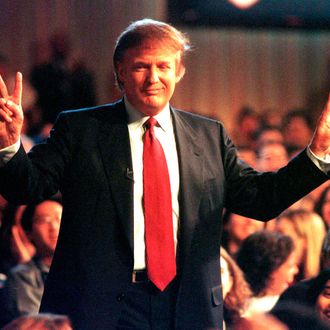
For much of Blue America, a White House occupied by Donald Trump is about as desirable as one occupied by space aliens. No other Republican candidate has anywhere near Trump’s unpopularity among the general public. Yet it’s far from clear whether Trump would do more harm to progressive priorities than his GOP rivals: The mogul is actually to the left of his party on health care, entitlements, and infrastructure spending. Now, as details of Trump’s foreign-policy worldview begin to emerge, antiwar Democrats may find that the Donald is a more appealing commander-in-chief than the putative “moderates” he’s up against.
In an interview with Bloomberg’s Josh Rogin on Sunday, Trump’s chief policy adviser Sam Clovis laid out the three planks of the GOP front-runner’s foreign-policy doctrine:
“One, we want to take a very clear worldview in our foreign policy, dealing with the national interest, and let that be our organizing principles. Two is that we want to make sure that we engage in free markets, but we want those markets to be fairer as well. And three, if we do not have strong economic recovery, we can’t do the other two … if that’s not a Trump doctrine, I don’t know what is.”
Rogin notes that Trump’s definition of the national interest is much narrower than GOP orthodoxy usually demands, essentially ruling out the use of military force for the purposes of democracy promotion or humanitarian intervention. Rather than seeking to change unfriendly, autocratic regimes militarily, “Trump believes that economic engagement will lead to political opening in the long run,” Rogin writes. “He doesn’t think the U.S. government should spend blood or treasure on trying to change other countries’ systems.”
In Clovis’s telling, Trump’s geopolitical strategy hearkens back to classical “realism,” a doctrine that prizes pragmatism over ideology — one that bears greater resemblance to Obama’s second-term positions than the interventionist neoconservatism of Jeb Bush or Marco Rubio. “Reagan would go after Qaddafi, but he would do business with Saddam,” Clovis told Bloomberg, likening Trump’s doctrine to Reagan’s realpolitik. “It’s a case-by-case basis of what’s in American interests.”
Although Trump has fiercely derided Obama’s nuclear agreement with Iran, his criticism has focused on the terms of the deal, not on the desirability of dealing with Iran diplomatically. Trump’s foreign-policy rhetoric brims with machismo, but his fantasies of alpha domination are most often set at a negotiating table, not a battlefield.
Whereas Marco Rubio, Jeb Bush, and Hillary Clinton have all called for establishing a no-fly zone in Syria — an act that would effectively entail shooting down Russian airplanes — Trump has shown no inclination to kick off a second Cold War. The mogul has proposed total war against ISIS, but he seems to believe that genuine states, even hostile ones, can be reasoned with. According to Clovis, Trump views Putin and other dictators as businessmen simply trying to advance the interests of their respective organizations. This perspective puts a corporatist gloss on the empathetic diplomacy that “progressive realists” like Robert Wright have championed.
To be sure, there is still much for liberals to fear and loathe about commander-in-chief Trump. At times, the GOP front-runner sounds like he is skeptical of human rights not only as a grounds for intervention but also as a concept worth honoring in any way. In multiple speeches, Trump has called for the collective punishment of women and children in ISIS territory. And liberal internationalists will find little to cheer in Trump’s fondness for friendly autocrats, including ousted Egyptian kleptocrat Hosni Mubarak.
But after the neoconservatives’ catastrophe in Iraq, and humanitarian interventionists’ Libya disaster, many progressives should see appeal in Trump’s hands-off attitude toward foreign affairs. In fact, many of Bernie Sanders’s foreign-policy statements — his skepticism toward intervention, insistence that the “mooslems” take ownership of Middle East conflicts, and his praise of Jordan’s autocratic leader — are all in keeping with the Trump doctrine.
A Trump presidency is surely a frightening prospect. But the Donald may actually be a more trustworthy steward of the nuclear codes than Establishment hawks like Marco Rubio and Jeb Bush — so long as no foreign leader insults him on Twitter, anyway.






























